September 11, 2014 •
South Carolina House Speaker Suspended Following Indictment
House Speaker Bobby Harrell has been suspended following an indictment on criminal charges of misconduct in office, using campaign funds for personal use, and falsifying candidate campaign disclosures. The nine-count indictment claims Harrell used hundreds of thousands of dollars in […]

House Speaker Bobby Harrell has been suspended following an indictment on criminal charges of misconduct in office, using campaign funds for personal use, and falsifying candidate campaign disclosures. The nine-count indictment claims Harrell used hundreds of thousands of dollars in campaign funds for personal expenses and falsified his private plane’s logbook to seek payment for travel that did not occur.
The complaint was filed by the director of the nonpartisan South Carolina Policy Council and follows a fight between Harrell and Attorney General Alan Wilson, who ordered an investigation of the speaker’s conduct last year.
September 11, 2014 •
Oakland, California Has New Campaign Disclosure Tool
A new web tool is available to follow the money in November’s mayoral election race. The Open Disclosure project is the product of a partnership between the Public Ethics Commission and OpenOakland, a civic innovation organization. The project displays campaign […]
 A new web tool is available to follow the money in November’s mayoral election race. The Open Disclosure project is the product of a partnership between the Public Ethics Commission and OpenOakland, a civic innovation organization.
A new web tool is available to follow the money in November’s mayoral election race. The Open Disclosure project is the product of a partnership between the Public Ethics Commission and OpenOakland, a civic innovation organization.
The project displays campaign finance data for the 15 mayoral candidates in a user friendly way, allowing the public to quickly see who is contributing, where they are contributing from, and in what amounts. Developers hope to expand the contribution information to all elected races in Oakland.
The information is available here.
September 10, 2014 •
Missouri Lawmakers Begin Veto Session
Missouri state lawmakers returned to Jefferson City today to start the veto session. During the regular session, Gov. Jay Nixon vetoed 33 regular bills and made line-item vetoes to hundreds of items in the state operating budget. Lawmakers were expected […]
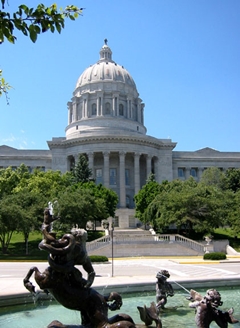 Missouri state lawmakers returned to Jefferson City today to start the veto session.
Missouri state lawmakers returned to Jefferson City today to start the veto session.
During the regular session, Gov. Jay Nixon vetoed 33 regular bills and made line-item vetoes to hundreds of items in the state operating budget.
Lawmakers were expected to prepare for a three-day session due to the historical number of vetoes to consider.
Photo of the Missouri Capitol by Nickbigd on Wikimedia Commons.
September 10, 2014 •
Nevada Legislature Begins Special Session to Consider Tesla Incentives
Gov. Brian Sandoval ordered the Nevada Legislature into special session beginning Wednesday, September 10, 2014. The purpose of the special session is to consider tax breaks offered to Tesla Motors in exchange for locating a battery plant in Nevada. Photo […]
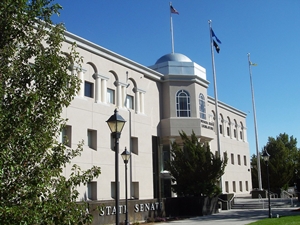 Gov. Brian Sandoval ordered the Nevada Legislature into special session beginning Wednesday, September 10, 2014.
Gov. Brian Sandoval ordered the Nevada Legislature into special session beginning Wednesday, September 10, 2014.
The purpose of the special session is to consider tax breaks offered to Tesla Motors in exchange for locating a battery plant in Nevada.
Photo of the Nevada Legislature courtesy of Dave Parker on Wikimedia Commons.
September 9, 2014 •
No Special Session for West Virginia Legislature
Governor Earl Ray Tomblin will not call a special legislative session to make changes to a new law regulating above-ground storage tanks. The law, created in response to the chemical contamination of drinking water for 300,000 people, sets a January […]
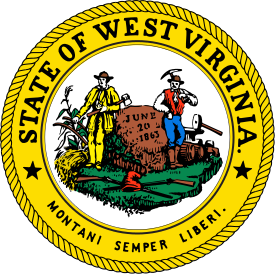 Governor Earl Ray Tomblin will not call a special legislative session to make changes to a new law regulating above-ground storage tanks. The law, created in response to the chemical contamination of drinking water for 300,000 people, sets a January 1 deadline for the implementation of tank inspections.
Governor Earl Ray Tomblin will not call a special legislative session to make changes to a new law regulating above-ground storage tanks. The law, created in response to the chemical contamination of drinking water for 300,000 people, sets a January 1 deadline for the implementation of tank inspections.
Lawmakers urged the governor to call a special session, believing that the deadline is unattainable and overly burdensome. Gov. Tomblin instead plans to use administrative means to adjust the law, placing greater focus on high risk areas and hazardous materials.
September 9, 2014 •
Ask the Experts – Disclosure Requirements for Permissible Expenditures
Q. I provided a state legislator with a permissible gift. I will be sure to include it on my next report. Is there anything else I need to know regarding proper disclosure of this expenditure. A. There are sometimes additional […]
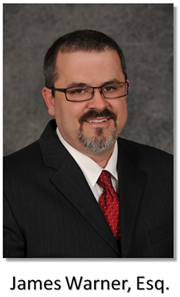 Q. I provided a state legislator with a permissible gift. I will be sure to include it on my next report. Is there anything else I need to know regarding proper disclosure of this expenditure.
Q. I provided a state legislator with a permissible gift. I will be sure to include it on my next report. Is there anything else I need to know regarding proper disclosure of this expenditure.
A. There are sometimes additional disclosure requirements related to an expenditure on a covered state official or employee. You should be sure to consider two possibilities: a notification to the official or a supplemental report in addition to your routine lobbying report.
A number of states have a notification requirement if you are going to list the name of a covered public official on your lobbying report. For example, Illinois actually requires two notifications. You must provide the official with a contemporaneous notification at the time of the expenditure, and a post- notification is required within 30 days after the report has been filed. In other jurisdictions, the notification is related to whether you must itemize the expenditure or list the official’s name on your report. In Arkansas, you must list the state official’s name if payment for food (including beverages), lodging, or travel is in excess of $40. Once the official is named on your report, you must provide him or her with a notification of this at least seven working days prior to the filing of your report. Pennsylvania imposes a yearly aggregate threshold on the listing of an official on the principal’s lobbying report and corresponding required notification. This threshold is $250 per calendar year for gifts and $650 per calendar year for transportation, lodging, and/or hospitality (which includes food and beverage). Please keep in mind that notifications are not filed with the state, but sent to the official named on your report.
Some jurisdictions require an additional report to be filed with the state when making certain permissible expenditures. For example, if you invite all members of a Maryland legislative unit to a meal or reception, you must extend a written invitation to all members of the legislative unit and register the meal or reception with the Maryland Department of Legislative Services at least five days before the date of the meal or reception. You must then report the details of the meal or reception to the Maryland Ethics Commission within 14 days after the date of the meal or reception. In Indiana, you must file a report within 15 days if you make a gift or gifts to a legislative person if the value of the gift or gifts equals $50 or more in one day or together totals more than $250 in a reporting year.
Proper disclosure of a permissible expenditure can include additional steps. Be sure to check with your jurisdiction’s ethics agency to ensure all disclosure requirements are met.
You can directly submit questions for this feature, and we will select those most appropriate and answer them here. Send your questions to: marketing@stateandfed.com.
(We are always available to answer questions from clients that are specific to your needs, and we encourage you to continue to call or e-mail us with questions about your particular company or organization. As always, we will confidentially and directly provide answers or information you need.) Our replies to your questions are not legal advice. Instead, these replies represent our analysis of laws, rules, and regulations.
September 9, 2014 •
Georgia Commission Prepares to Amend Rules
The state ethics commission is preparing to amend rules regarding campaign finance and lobbyist reporting. The campaign finance changes include allowing the commission to raise or lower campaign contribution limits at the end of four-year election cycles rather than every […]
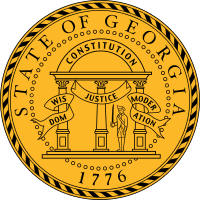 The state ethics commission is preparing to amend rules regarding campaign finance and lobbyist reporting. The campaign finance changes include allowing the commission to raise or lower campaign contribution limits at the end of four-year election cycles rather than every calendar year. The rules would also clarify only contributions to candidates can trigger the $25,000 annual registration and reporting threshold for individuals or entities making contributions.
The state ethics commission is preparing to amend rules regarding campaign finance and lobbyist reporting. The campaign finance changes include allowing the commission to raise or lower campaign contribution limits at the end of four-year election cycles rather than every calendar year. The rules would also clarify only contributions to candidates can trigger the $25,000 annual registration and reporting threshold for individuals or entities making contributions.
Lobbying amendments would require reporting for gifts to family of officials and permit gift splitting by multiple lobbyists so long as a single lobbyist does not exceed the $75 limits.
A public hearing on the proposed changes is scheduled for September 30, 2014.
September 9, 2014 •
Judge Enjoins Enforcement of Wisconsin Candidate Limits
A federal judge entered a preliminary injunction in favor of a conservative group challenging the state’s limits on the amount candidates can collect from political action committees. The group argued the limits infringed upon its First Amendment free speech rights. […]
 A federal judge entered a preliminary injunction in favor of a conservative group challenging the state’s limits on the amount candidates can collect from political action committees. The group argued the limits infringed upon its First Amendment free speech rights.
A federal judge entered a preliminary injunction in favor of a conservative group challenging the state’s limits on the amount candidates can collect from political action committees. The group argued the limits infringed upon its First Amendment free speech rights.
The judge agreed and issued a preliminary injunction preventing the Government Accountability Board from enforcing the limit.
September 8, 2014 •
Nevada Special Session May Be Called This Week
Nevada Gov. Brian Sandoval may call the Legislature into a special session as soon as Wednesday to approve a plan for the $5 billion Tesla plant in the state. According the Los Angeles Times, the electric car company and the […]
 Nevada Gov. Brian Sandoval may call the Legislature into a special session as soon as Wednesday to approve a plan for the $5 billion Tesla plant in the state.
Nevada Gov. Brian Sandoval may call the Legislature into a special session as soon as Wednesday to approve a plan for the $5 billion Tesla plant in the state.
According the Los Angeles Times, the electric car company and the state have reached an agreement to have Tesla manufacture batteries in Nevada. The Office of the Governor predicts the proposed lithium-ion battery plant would create 6,500 factory jobs and 16,000 other jobs, including 3,000 in construction.
The Los Angeles Times reports the Legislature is required to enact parts of the agreement in order for the deal to go through. This includes allowing Tesla to “receive up to a 100% tax abatement for the next 20 years for all sales tax, and up to a 100% tax abatement for the next 10 years for all real property tax, personal property tax and modified business tax,” according the Los Angeles Times.
September 8, 2014 •
Bucket of States to Still Visit
I figured it is time to list the states I still need to visit. In this government relations industry, we have the opportunity to go to many states. And, with two meetings in Anchorage, many of our colleagues have seen […]
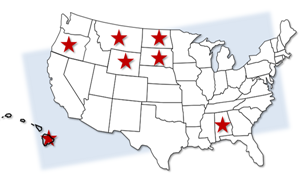 I figured it is time to list the states I still need to visit. In this government relations industry, we have the opportunity to go to many states. And, with two meetings in Anchorage, many of our colleagues have seen them all from Alabama to Wyoming.
I figured it is time to list the states I still need to visit. In this government relations industry, we have the opportunity to go to many states. And, with two meetings in Anchorage, many of our colleagues have seen them all from Alabama to Wyoming.
I started a list a year ago when Sen. Bruce Starr from Oregon was elected president of NCSL and had scheduled an executive committee meeting. But, alas, I was unable to attend, so it remains on the list.
Here is a list of the states. What are your outstanding ones? And, if any of you have Ohio on that list, you need to call me to attend any of a number sporting events or a visit to the Rock and Roll Hall of Fame. I personally have season tickets to the home games of both the University of Akron and Kent State University…Now, those are hot teams!
Back to the subject. I am now down to the final seven (7) and know in 2015 one will be knocked off the list because of CSG’s Midwest Legislative Conference.
- Alabama — Lost a chance in 2013 when Kent State University was in the football playoffs but could not get back in time for business meetings.
- Hawaii — Big surprise this is still on my list.
- Montana — Does this state still not have a speed limit? That’s what David Letterman says.
- North Dakota — Ding, ding, ding…Off the list in 2015.
- Oregon — Hmm. Maybe a trip to Nike is in order.
- South Dakota — Could I knock off this state after MLC next year?
- Wyoming — I guess we have to go to Jackson Hole.
It is possible. It is not a race…just a goal to finish.
Until next month, put your list together of states still left to see.
Thank you,
Elizabeth Z. Bartz
President and CEO
@elizabethbartz
September 8, 2014 •
DE Gov. Signs Revolving Door Bill
On September 4, 2014, Gov. Jack Markell signed House Bill 13 into law. Under the bill, any person who served as a member of the Delaware General Assembly is prohibited from acting as a lobbyist for one year after the […]
 On September 4, 2014, Gov. Jack Markell signed House Bill 13 into law.
On September 4, 2014, Gov. Jack Markell signed House Bill 13 into law.
Under the bill, any person who served as a member of the Delaware General Assembly is prohibited from acting as a lobbyist for one year after the person’s term of office is completed.
The bill takes effect January 1, 2017.
September 8, 2014 •
New Integrity Commissioner for Toronto, Canada
Valerie Jepson began her term as the city’s new integrity commissioner on September 6. Jepson, whose appointment was approved by the City Council in June, replaces Janet Leiper, the commissioner since 1999. Jepson was counsel for the Office of the […]
 Valerie Jepson began her term as the city’s new integrity commissioner on September 6. Jepson, whose appointment was approved by the City Council in June, replaces Janet Leiper, the commissioner since 1999. Jepson was counsel for the Office of the Ontario Integrity Commissioner since 2007.
Valerie Jepson began her term as the city’s new integrity commissioner on September 6. Jepson, whose appointment was approved by the City Council in June, replaces Janet Leiper, the commissioner since 1999. Jepson was counsel for the Office of the Ontario Integrity Commissioner since 2007.
September 5, 2014 •
News You Can Use Digest – September 5, 2014
National: Voting Restrictions Are Key Variable in Midterm Elections New York Times – John Harwood | Published: 9/3/2014 After decades of expansion in American voting methods, an estimated one-third of all ballots this year will be cast before the traditional Election […]

National:
Voting Restrictions Are Key Variable in Midterm Elections
New York Times – John Harwood | Published: 9/3/2014
After decades of expansion in American voting methods, an estimated one-third of all ballots this year will be cast before the traditional Election Day on November 4. Yet this year, the trend collides with a Republican-led pushback in some states – for reasons of cost-cutting and election integrity or, as the Obama administration and civil rights groups suggest, crimping turnout by Democrats. Various new restrictions on voting, which range from more stringent identification requirements to fewer registration opportunities to curbs on early voting, have been put in place. A critical election variable is whether the new limits will tilt close races.
Federal:
Wealthy Political Donors Seize on New Latitude to Give to Unlimited Candidates
Washington Post – Matea Gold | Published: 9/2/2014
Wealthy political donors have more access than ever to candidates since the ruling in McCutcheon v. Federal Election Commission, which did away with the aggregate contribution limit for congressional candidates. More than 300 donors have seized the opportunity, writing checks at such a furious pace that they have exceeded the old limit of $123,200 for this election cycle, according to data from the Center for Responsive Politics. Together, 310 donors gave a combined $11.6 million more by this summer than would have been allowed before the ruling.
From the States and Municipalities:
Alabama – John Carroll Appointed Acting Ethics Commission Director
Montgomery Advertiser – Brian Lyman | Published: 9/2/2014
John Carroll, a retired federal judge and former law school dean, will serve as acting director of the Alabama Ethics Commission beginning October 1, succeeding Jim Sumner. The commission is still seeking a permanent director for the position, and plans to accept applications until September 30. Any individual selected for the position will have to be confirmed by the state Senate, which is not expected to reconvene until next March.
California – California Lawmakers Send Governor New Gift Rules after Scandals
Los Angeles Times – Patrick McGreevy | Published: 8/29/2014
California lawmakers gave final approval to a bill that reduces to $200 from $440 the value of gifts officials can receive from a single source each year. Senate Bill 1443, which was sent to Gov. Jerry Brown, also bans all gifts from lobbyists. The legislation prohibits officials from accepting certain kinds of gifts from anyone, including tickets to concerts, sports events, and amusement parks; spa services and rounds of golf; and cash and gift cards.
California – Legislative Session Ends with Campaign-Finance Bills Growing out of Senate Corruption Cases
Columbus Republic – Fenit Nirappel (Associated Press) | Published: 8/30/2014
California lawmakers approved two bills aimed at addressing a string of recent scandals. Senate Bill 1442 would increase the frequency of detailed campaign spending reports from twice a year to quarterly. Senate Bill 831 would ban elected officials from requesting payments on their behalf to nonprofit organizations run by family members, a tactic sometimes used in place of campaign contributions. It would also require nonprofit groups that pay for politicians to go on trips to disclose the donors who fund the travel. Both bills now head to the governor’s desk.
Colorado – Federal Lawsuit Challenges McCain-Feingold Disclosure Law
Legal Newsline – David Yates | Published: 9/4/2014
The Center for Competitive Politics filed two lawsuits on behalf of a Colorado think tank, asserting that similar state and federal campaign finance disclosure laws are unconstitutional. The Independence Institute wants to run two ads, one asking U.S. Sens. Mark Udall and Michael Bennett to support a federal sentencing reform bill, and one asking citizens to urge Colorado Gov. John Hickenlooper to initiate an audit of the state Health Benefit Exchange. But the institute claims the Bipartisan Campaign Reform Act, along with a similar Colorado law, effectively prevents the group from raising money for the ads.
Florida – Tallahassee Voters Will Decide Ethics Proposal
Tallahassee Democrat – Jeff Burlew | Published: 9/3/2014
Tallahassee voters will get to decide whether to add an ethics code to the city’s charter in November. The city commission approved the ballot measure after a judge ruled the amendment complied with state law. If approved by voters, the charter amendment would create an ethics and anti-corruption policy, require enactment of an ethics code, establish an ethics board, lower the cap on campaign donations, and allow for limited public financing of campaigns.
Georgia – Judge Issues $20,000 in Sanctions against AG, Ethics Commission Director over Trial Documents
Greenfield Daily Reporter – Christina Cassidy (Associated Press) | Published: 9/3/2014
A judge fined the Georgia attorney general’s office and the executive secretary of the state ethics commission for neglecting to hand over key documents in a whistleblower lawsuit against the commission. Fulton County Superior Court Judge Ural Glanville ordered Holly LaBerge and the attorney general’s office to each pay $10,000 to cover the litigation expenses of the plaintiff, former ethics commission Executive Secretary Stacy Kalberman. “The court is extremely troubled by the behavior of … LaBerge, who has been dishonest and non-transparent throughout these proceedings,” wrote Glanville.
Illinois – Emanuel Signing Order to Boost Contractors’ Minimum Wage Rate
Chicago Tribune – John Byrne | Published: 9/3/2014
Chicago Mayor Rahm Emanuel signed an executive order that requires city contractors and subcontractors to pay employees a $13-an-hour minimum wage. It will apply to city contractors advertised after October 1 and will affect about 1,000 contracted employees, typically landscapers, maintenance workers, security officers, concessionaires, and custodians.
Mississippi – Appeal May Revive Campaign-Spending Law
Courthouse News Service – Sabrina Canfield | Published: 9/4/2014
The state of Mississippi is asking the Fifth U.S. Circuit Court of Appeals to reverse a lower court ruling that found part of a campaign finance law unconstitutional. Under the state law, groups seeking to support or oppose statewide ballot measures must register as a political committee if they receive contributions of more than $200 or spend more than $200 during a calendar year. Opponents argue the $200 threshold is so low it would be impossible for a group of people to run a quarter-page ad in their local newspaper without having to become a political committee.
Rhode Island – Convicted R.I. Hospital Executive Urciuoli Seeks $3.6M in Severance, Trial Costs
Providence Journal – Katie Mulvaney | Published: 9/3/2014
Robert Urciuoli, a former executive at Roger Williams Medical Center who was convicted on corruption charges, is seeking nearly $3.6 million in severance pay and legal costs from the Providence hospital. Urciuoli says in federal court papers he could only be terminated for “cause” under his contract as the hospital’s chief executive. He also said evidence shows his lawyers told him a deal to promote the hospital and a nursing home with former state Sen. John Celona was legal. Urciuoli served a three-year prison sentence for buying Celona’s influence. Celona pleaded guilty and also served prison time.
Virginia – Ex-Governor McDonnell and Wife Convicted After Corruption Trial
New York Times – Trip Gabriel | Published: 9/4/2014
A federal jury found former Virginia Gov. Robert McDonnell and his wife, Maureen, guilty of public corruption. Robert McDonnell was convicted of 11 corruption-related counts, though acquitted of lying on loan documents. The former first lady was convicted of eight corruption-related charges, along with obstruction of justice. Maureen McDonnell was acquitted of lying on a loan document. The jury found the McDonnells lent the prestige of the governor’s office to businessperson Jonnie Williams Sr. in exchange for $177,000 in gifts and loans. The five-week trial at times resembled a soap opera, as the McDonnells endured an embarrassing dissection of their relationship.
 State and Federal Communications produces a weekly summary of national news, offering more than 80 articles per week focused on ethics, lobbying, and campaign finance.
State and Federal Communications produces a weekly summary of national news, offering more than 80 articles per week focused on ethics, lobbying, and campaign finance.
August 29, 2014 •
See You Next Week
Lobby Comply will be taking a one-week break. We’ll be back on Friday, September 5 with our weekly News You Can Use Digest. Enjoy your Labor Day weekend!

Lobby Comply will be taking a one-week break. We’ll be back on Friday, September 5 with our weekly News You Can Use Digest.
Enjoy your Labor Day weekend!
State and Federal Communications, Inc. provides research and consulting services for government relations professionals on lobbying laws, procurement lobbying laws, political contribution laws in the United States and Canada. Learn more by visiting stateandfed.com.

